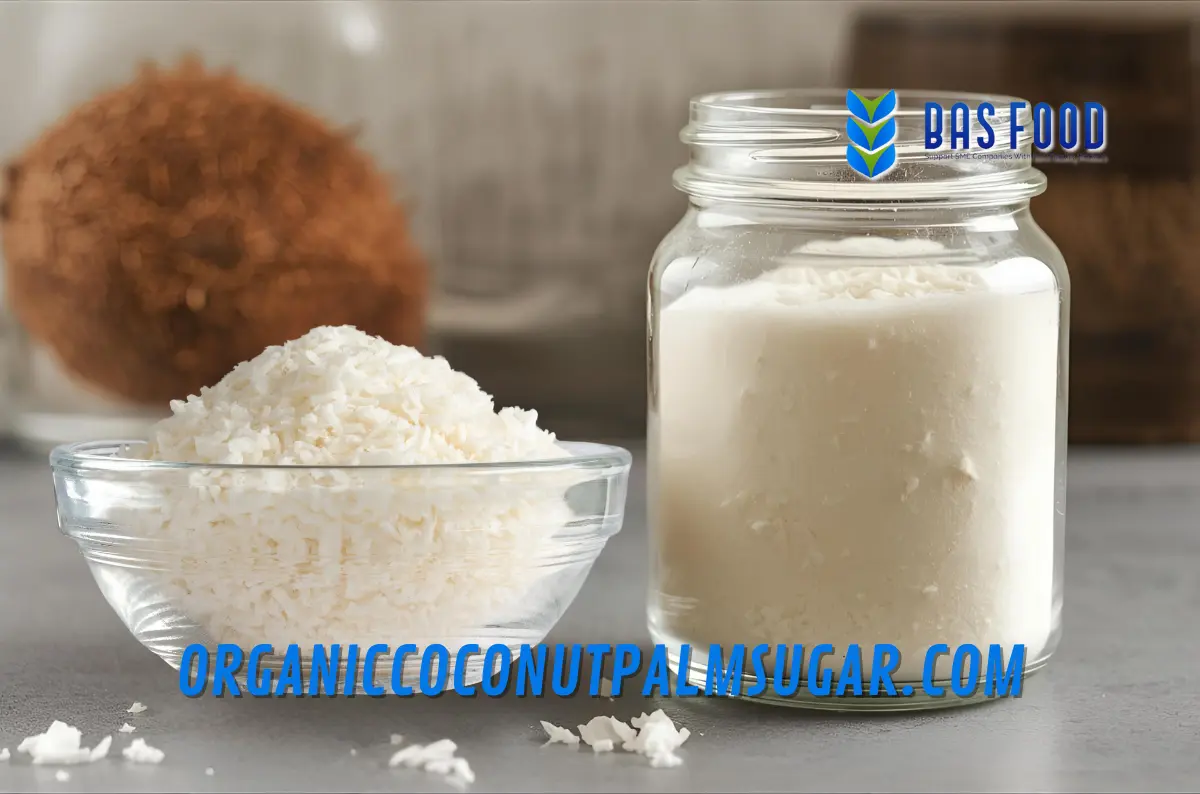When it comes to coconut-based ingredients, it’s easy to get confused between desiccated coconut and coconut powder. Understanding the differences, particularly desiccated coconut vs coconut powder, is key. Both are derived from the same fruit, yet they serve different purposes in the kitchen and food manufacturing. Whether you’re baking, cooking, or developing products for the F&B industry, understanding these two ingredients helps you choose the right one for the right texture, flavor, and consistency.
This detailed guide explores desiccated coconut vs coconut powder — from their production and texture differences to how they fit into recipes and industrial applications. We’ll also dive into their classifications such as coconut fine grade and coconut coarse grade, and wrap up with insights from CV Bonafide Anugerah Sentosa, a trusted Indonesian supplier and producer of premium coconut products, spices, and fishery commodities.

What Is Desiccated Coconut?
Desiccated coconut is made from fresh white coconut meat that’s shredded or grated and then dried to a low moisture level — typically below 3%. The result is a clean, white, and fragrant product with a naturally sweet flavor. It comes in two common forms: fine grade (smaller particles for smooth-textured products) and coarse grade (larger flakes for texture and appearance).
This ingredient is a favorite among bakeries, confectioners, and food manufacturers for its versatility. It adds chewiness and a mild tropical aroma to cakes, cookies, biscuits, granola bars, and even savory dishes. Because it’s naturally gluten-free and rich in fiber, it also appeals to health-conscious consumers looking for clean-label ingredients.
Unlike many processed coconut products, desiccated coconut doesn’t go through chemical treatment. It’s simply shredded, pasteurized, and dried — maintaining the fruit’s natural oils and nutrients.
What Is Coconut Powder?
While desiccated coconut retains visible shreds of the coconut meat, coconut powder is a much finer, almost flour-like product. It’s made by drying and finely grinding coconut meat into a soft, powdery form. The texture resembles milk powder or fine wheat flour, making it ideal for blending and dissolving in liquid recipes.
Coconut powder is often used to make instant coconut milk — simply by mixing it with warm water. It’s a convenient solution for manufacturers, restaurants, and home users who want coconut flavor and creaminess without the hassle of cracking and extracting from fresh coconuts.
Besides beverage applications, coconut powder works well in desserts, sauces, curries, and baked goods. It gives smooth consistency and enhances the creamy, nutty aroma typical of coconut-based recipes.
Texture and Grade: Coconut Fine Grade vs Coarse Grade
Texture plays a major role in distinguishing desiccated coconut vs coconut powder. Desiccated coconut maintains a fibrous structure that gives products texture and bite. It comes in two main grades:
- Coconut Fine Grade: With smaller particle size, it mixes seamlessly into doughs, coatings, and confectionery fillings. Bakers prefer it for consistent distribution and smoother texture.
- Coconut Coarse Grade: Larger flakes that retain shape and visual appeal. This type is perfect for decorating cakes, coating pastries, or adding crunch to granola and energy bars.
- Coconut powder, however, doesn’t fall into these grades because it’s uniform and powdery. It’s meant to blend or dissolve completely, not to provide texture. This difference in physical structure determines how each ingredient behaves in recipes — and why substituting one for another doesn’t always work.
In a bakery ingredient guide, fine desiccated coconut is used for body and texture, while coconut powder acts as a flavor enhancer or liquid base. Understanding this distinction is essential for consistent results in professional baking or product formulation.
Processing Methods: How Each Ingredient Is Made
Both desiccated coconut and coconut powder start with the same raw material — mature, high-quality coconuts. However, the production process diverges after the coconut meat is extracted.
Desiccated Coconut Production
The process involves grating the white coconut meat into fine or coarse pieces, blanching it to reduce microbial activity, and then drying it under controlled temperatures. The goal is to reduce moisture while preserving oil content, aroma, and flavor. The result is a naturally preserved product that’s shelf-stable for months.
Coconut Powder Production
Coconut powder, meanwhile, goes through an additional step of grinding and spray-drying. Sometimes, coconut milk is first extracted from the grated meat, then dried to form powder. This results in a finer texture with less visible fiber and more concentration of coconut solids.
The organic coconut powder often maintains a creamy color and a balanced fat content, making it easy to reconstitute into coconut milk or cream.
Both products, when produced under ISO food safety and organic certification standards, meet international quality expectations for export markets — something companies like CV Bonafide Anugerah Sentosa ensure with every batch.
Applications in Baking and Food Manufacturing
When comparing desiccated coconut vs coconut powder, their use in baking is where the difference becomes most obvious.
Desiccated Coconut in Baking
Desiccated coconut is primarily used as a structural ingredient. Its fibrous texture gives baked goods chewiness and mouthfeel. Bakers often use it in cookies, macaroons, sponge cakes, and toppings for pastries. It adds flavor, improves texture, and provides a visually appealing surface when toasted.
Because it comes in both fine and coarse grades, it can be adapted to different recipes — fine grade for soft batters, coarse grade for decoration or fillings.
Coconut Powder in Baking
Coconut powder works best when you want a smooth, consistent coconut flavor without the texture. It can be incorporated into doughs and batters for cakes, muffins, and pancakes to enhance flavor. In industrial food manufacturing, it’s also used in instant drink mixes, sauces, and ready-to-eat meal bases for its convenience and solubility.
In a bakery ingredient guide, you’ll find that using coconut powder allows for flavor control, while desiccated coconut contributes more to the texture and visual appeal. Both, when used together, can create rich, tropical-tasting products that stand out in today’s market.
Nutritional and Functional Differences
While both products originate from coconut, their nutritional profiles differ slightly due to processing.
- Desiccated Coconut retains more natural oil (and therefore more fat and calories). It’s rich in medium-chain triglycerides (MCTs), which provide quick energy and support metabolism.
- Coconut Powder, depending on its formulation, may have lower fat but higher carbohydrate and protein content. It’s often fortified or blended for specific applications like beverages or meal replacements.
In terms of coconut nutrition, both are gluten-free, high in fiber, and contain essential minerals like manganese and copper. However, desiccated coconut’s fat content makes it more satiating, while coconut powder’s versatility makes it ideal for reconstitution and blending.
Functionally, desiccated coconut contributes bulk and chewiness, while coconut powder adds creaminess and flavor enhancement.
Choosing the Right Ingredient for Your Product
Selecting between desiccated coconut vs coconut powder depends on your end product. If texture and natural appearance matter — for instance, in cookies, snack bars, or coatings — go with desiccated coconut. If smoothness and easy solubility are key, as in beverages, sauces, or soft batters, coconut powder is the better option.
For commercial buyers or food manufacturers, choosing a reliable source is equally important. CV Bonafide Anugerah Sentosa, based in Indonesia, is one of the region’s most trusted suppliers and producers of coconut-based products, spices, coffee, and fishery commodities. The company offers both coconut fine grade and coconut coarse grade desiccated coconut, as well as high-quality coconut powder processed under strict food safety standards.
With sustainable sourcing and advanced processing facilities, Bonafide ensures consistent quality that meets global export standards — making it a go-to partner for businesses seeking authentic Indonesian coconut products.
Sustainability and Export Potential
Indonesia remains one of the world’s leading coconut producers, with vast plantations across Sumatra, Sulawesi, and Java. The country’s commitment to eco-friendly coconut farming and efficient processing ensures the global supply of sustainable coconut ingredients like desiccated coconut and coconut powder.
By exporting high-quality coconut derivatives, Indonesian companies like CV Bonafide Anugerah Sentosa contribute not only to global food supply but also to rural economic development. The coconut industry supports thousands of smallholder farmers while promoting the use of every part of the coconut — from husk to shell — for various industries.
This sustainable model aligns with the increasing demand for clean, traceable, and environmentally responsible food ingredients worldwide.
Conclusion: Two Coconut Stars, One Purpose
In the comparison of desiccated coconut vs coconut powder, there’s no real winner — only the right choice for the right purpose. Desiccated coconut shines when you need structure, texture, and visible coconut pieces. Coconut powder, meanwhile, excels in applications requiring smoothness, solubility, and consistent flavor.
Both ingredients reflect the versatility of coconut, nature’s most resourceful fruit. When sourced from reliable suppliers like CV Bonafide Anugerah Sentosa, you get not just premium quality but also assurance of ethical production and international standards.
Whether you’re developing new bakery products or upgrading your food formulations, these coconut derivatives open endless possibilities — deliciously, naturally, and sustainably.
Contact CV Bonafide Anugerah Sentosa how we can provide the best solutions for you. WhatsApp: +62 8213 4505 737, Email: info@bonafideanugerahsentosa.com / bas.mdir@gmail.com.

